Analyzing Marx's Theory of Class Division: A Sociological Perspective
VerifiedAdded on 2022/08/08
|8
|2273
|411
Essay
AI Summary
This essay provides a comprehensive analysis of Karl Marx's theory of class division, a cornerstone of Marxist thought. It begins by outlining the fundamental division of society into two primary classes: the Proletariat (wage earners) and the Bourgeoisie (capitalists). The essay then delves into Marx's concept of alienation, exploring how workers become estranged from their labor, the products of their labor, their fellow workers, and their own creative potential. It examines the historical context and critiques of Marx's theory, including the perspectives of Max Weber and other theorists. The essay further discusses the criticisms of Marx's ideas by various political ideologies, including democratic socialists and anarchists. It highlights Marx's focus on the ownership of the means of production and control of labor power as the defining criteria for class distinctions. The essay concludes by emphasizing the enduring relevance of Marx's ideas in understanding social and economic inequalities.
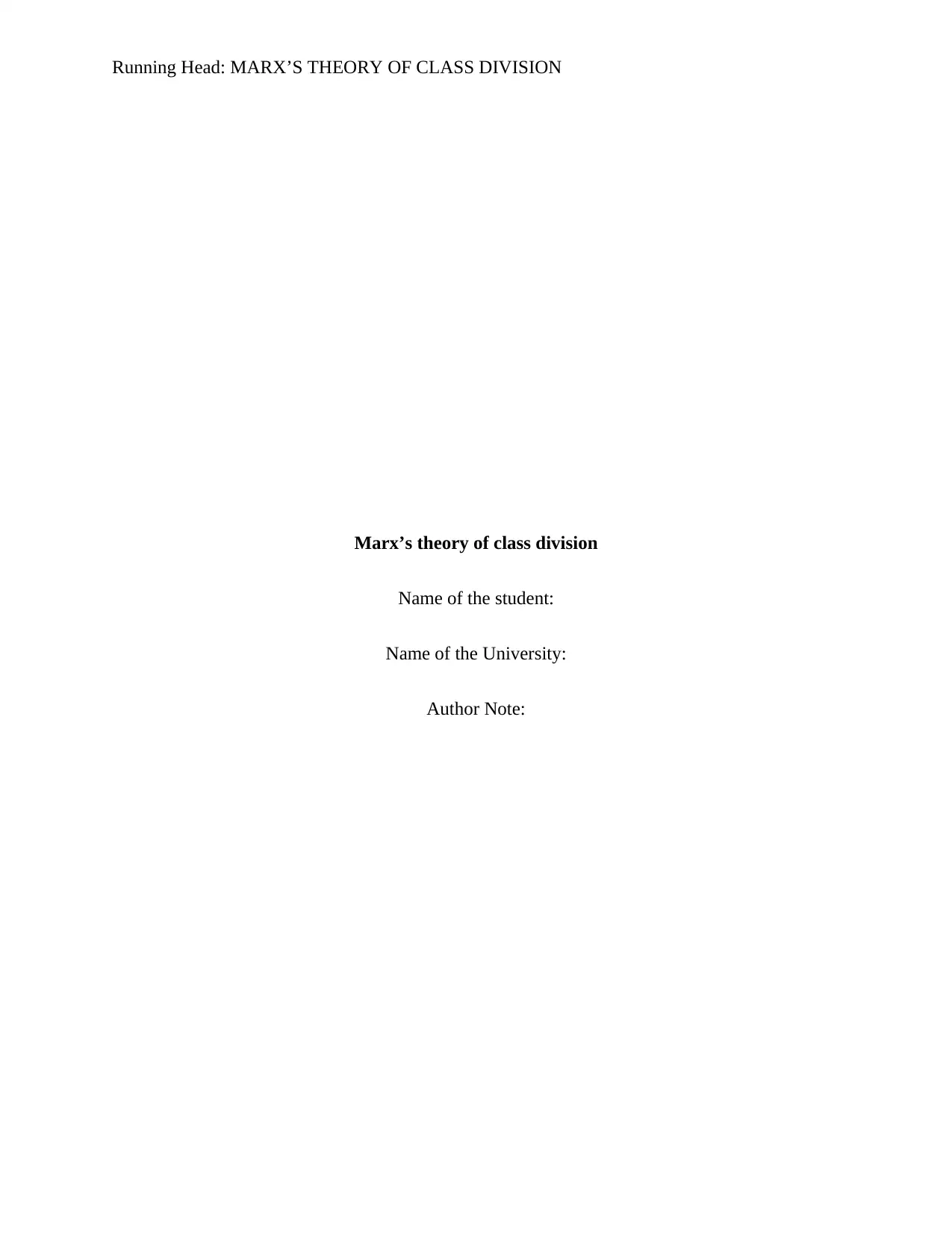
Running Head: MARX’S THEORY OF CLASS DIVISION
Marx’s theory of class division
Name of the student:
Name of the University:
Author Note:
Marx’s theory of class division
Name of the student:
Name of the University:
Author Note:
Paraphrase This Document
Need a fresh take? Get an instant paraphrase of this document with our AI Paraphraser
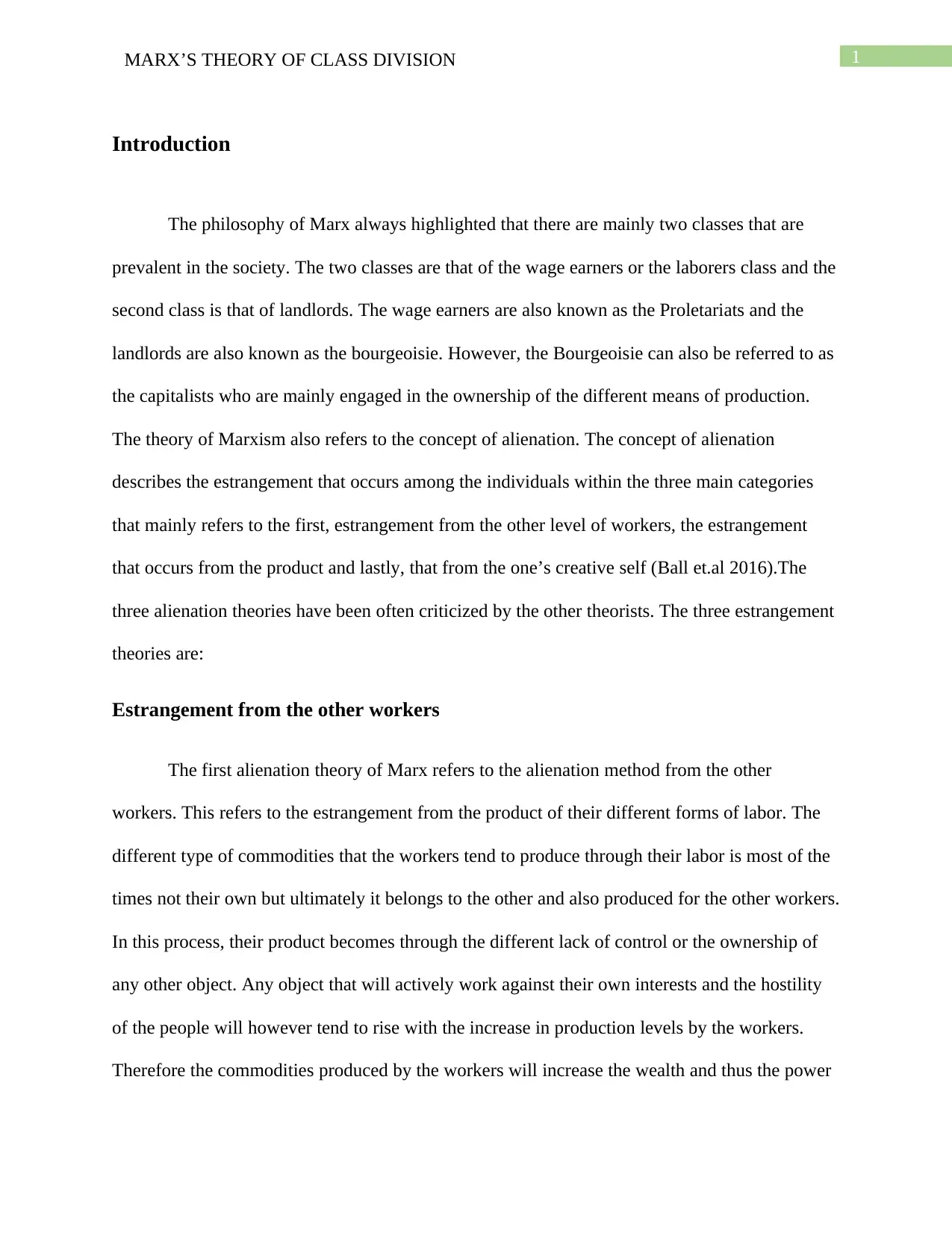
1MARX’S THEORY OF CLASS DIVISION
Introduction
The philosophy of Marx always highlighted that there are mainly two classes that are
prevalent in the society. The two classes are that of the wage earners or the laborers class and the
second class is that of landlords. The wage earners are also known as the Proletariats and the
landlords are also known as the bourgeoisie. However, the Bourgeoisie can also be referred to as
the capitalists who are mainly engaged in the ownership of the different means of production.
The theory of Marxism also refers to the concept of alienation. The concept of alienation
describes the estrangement that occurs among the individuals within the three main categories
that mainly refers to the first, estrangement from the other level of workers, the estrangement
that occurs from the product and lastly, that from the one’s creative self (Ball et.al 2016).The
three alienation theories have been often criticized by the other theorists. The three estrangement
theories are:
Estrangement from the other workers
The first alienation theory of Marx refers to the alienation method from the other
workers. This refers to the estrangement from the product of their different forms of labor. The
different type of commodities that the workers tend to produce through their labor is most of the
times not their own but ultimately it belongs to the other and also produced for the other workers.
In this process, their product becomes through the different lack of control or the ownership of
any other object. Any object that will actively work against their own interests and the hostility
of the people will however tend to rise with the increase in production levels by the workers.
Therefore the commodities produced by the workers will increase the wealth and thus the power
Introduction
The philosophy of Marx always highlighted that there are mainly two classes that are
prevalent in the society. The two classes are that of the wage earners or the laborers class and the
second class is that of landlords. The wage earners are also known as the Proletariats and the
landlords are also known as the bourgeoisie. However, the Bourgeoisie can also be referred to as
the capitalists who are mainly engaged in the ownership of the different means of production.
The theory of Marxism also refers to the concept of alienation. The concept of alienation
describes the estrangement that occurs among the individuals within the three main categories
that mainly refers to the first, estrangement from the other level of workers, the estrangement
that occurs from the product and lastly, that from the one’s creative self (Ball et.al 2016).The
three alienation theories have been often criticized by the other theorists. The three estrangement
theories are:
Estrangement from the other workers
The first alienation theory of Marx refers to the alienation method from the other
workers. This refers to the estrangement from the product of their different forms of labor. The
different type of commodities that the workers tend to produce through their labor is most of the
times not their own but ultimately it belongs to the other and also produced for the other workers.
In this process, their product becomes through the different lack of control or the ownership of
any other object. Any object that will actively work against their own interests and the hostility
of the people will however tend to rise with the increase in production levels by the workers.
Therefore the commodities produced by the workers will increase the wealth and thus the power
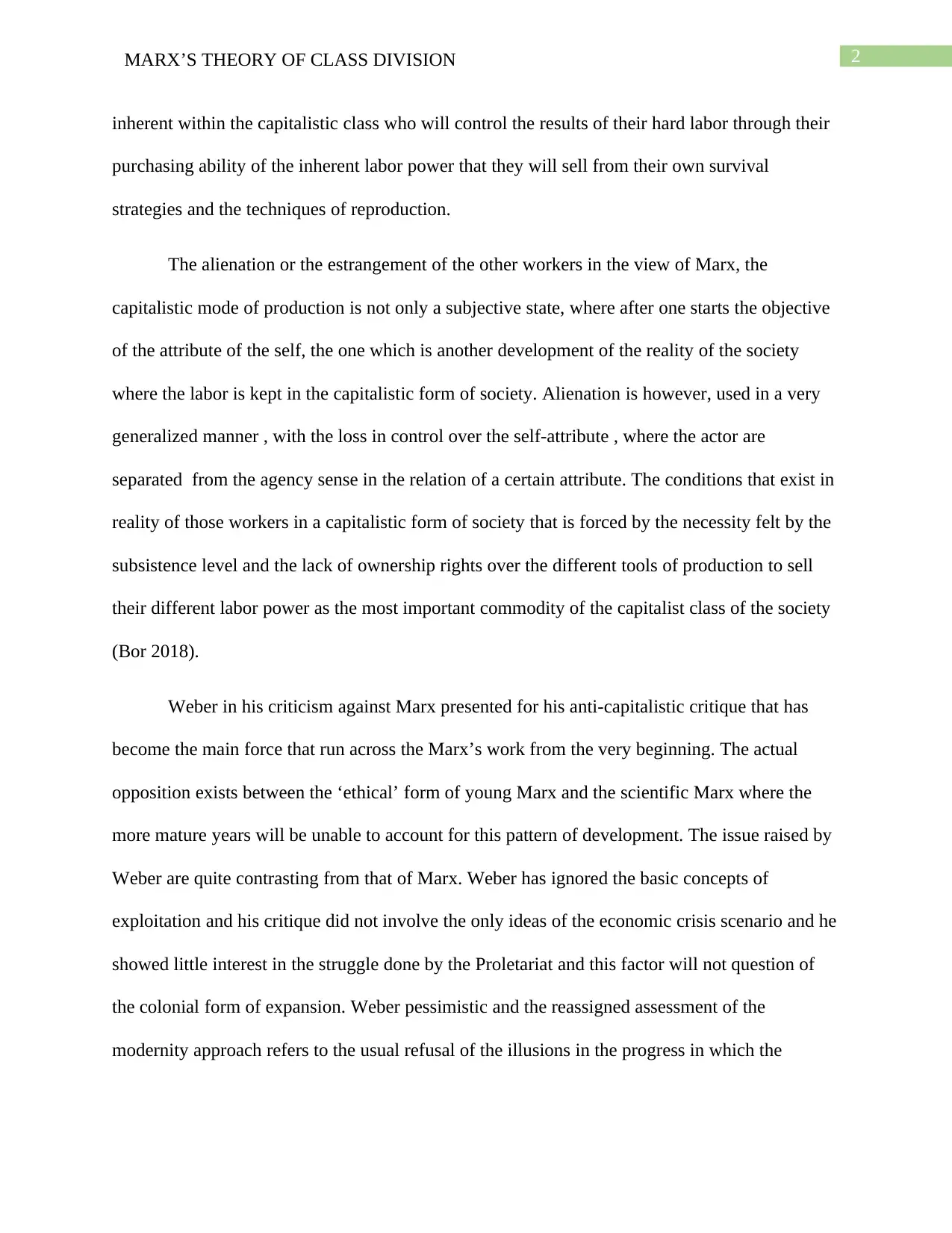
2MARX’S THEORY OF CLASS DIVISION
inherent within the capitalistic class who will control the results of their hard labor through their
purchasing ability of the inherent labor power that they will sell from their own survival
strategies and the techniques of reproduction.
The alienation or the estrangement of the other workers in the view of Marx, the
capitalistic mode of production is not only a subjective state, where after one starts the objective
of the attribute of the self, the one which is another development of the reality of the society
where the labor is kept in the capitalistic form of society. Alienation is however, used in a very
generalized manner , with the loss in control over the self-attribute , where the actor are
separated from the agency sense in the relation of a certain attribute. The conditions that exist in
reality of those workers in a capitalistic form of society that is forced by the necessity felt by the
subsistence level and the lack of ownership rights over the different tools of production to sell
their different labor power as the most important commodity of the capitalist class of the society
(Bor 2018).
Weber in his criticism against Marx presented for his anti-capitalistic critique that has
become the main force that run across the Marx’s work from the very beginning. The actual
opposition exists between the ‘ethical’ form of young Marx and the scientific Marx where the
more mature years will be unable to account for this pattern of development. The issue raised by
Weber are quite contrasting from that of Marx. Weber has ignored the basic concepts of
exploitation and his critique did not involve the only ideas of the economic crisis scenario and he
showed little interest in the struggle done by the Proletariat and this factor will not question of
the colonial form of expansion. Weber pessimistic and the reassigned assessment of the
modernity approach refers to the usual refusal of the illusions in the progress in which the
inherent within the capitalistic class who will control the results of their hard labor through their
purchasing ability of the inherent labor power that they will sell from their own survival
strategies and the techniques of reproduction.
The alienation or the estrangement of the other workers in the view of Marx, the
capitalistic mode of production is not only a subjective state, where after one starts the objective
of the attribute of the self, the one which is another development of the reality of the society
where the labor is kept in the capitalistic form of society. Alienation is however, used in a very
generalized manner , with the loss in control over the self-attribute , where the actor are
separated from the agency sense in the relation of a certain attribute. The conditions that exist in
reality of those workers in a capitalistic form of society that is forced by the necessity felt by the
subsistence level and the lack of ownership rights over the different tools of production to sell
their different labor power as the most important commodity of the capitalist class of the society
(Bor 2018).
Weber in his criticism against Marx presented for his anti-capitalistic critique that has
become the main force that run across the Marx’s work from the very beginning. The actual
opposition exists between the ‘ethical’ form of young Marx and the scientific Marx where the
more mature years will be unable to account for this pattern of development. The issue raised by
Weber are quite contrasting from that of Marx. Weber has ignored the basic concepts of
exploitation and his critique did not involve the only ideas of the economic crisis scenario and he
showed little interest in the struggle done by the Proletariat and this factor will not question of
the colonial form of expansion. Weber pessimistic and the reassigned assessment of the
modernity approach refers to the usual refusal of the illusions in the progress in which the
⊘ This is a preview!⊘
Do you want full access?
Subscribe today to unlock all pages.

Trusted by 1+ million students worldwide
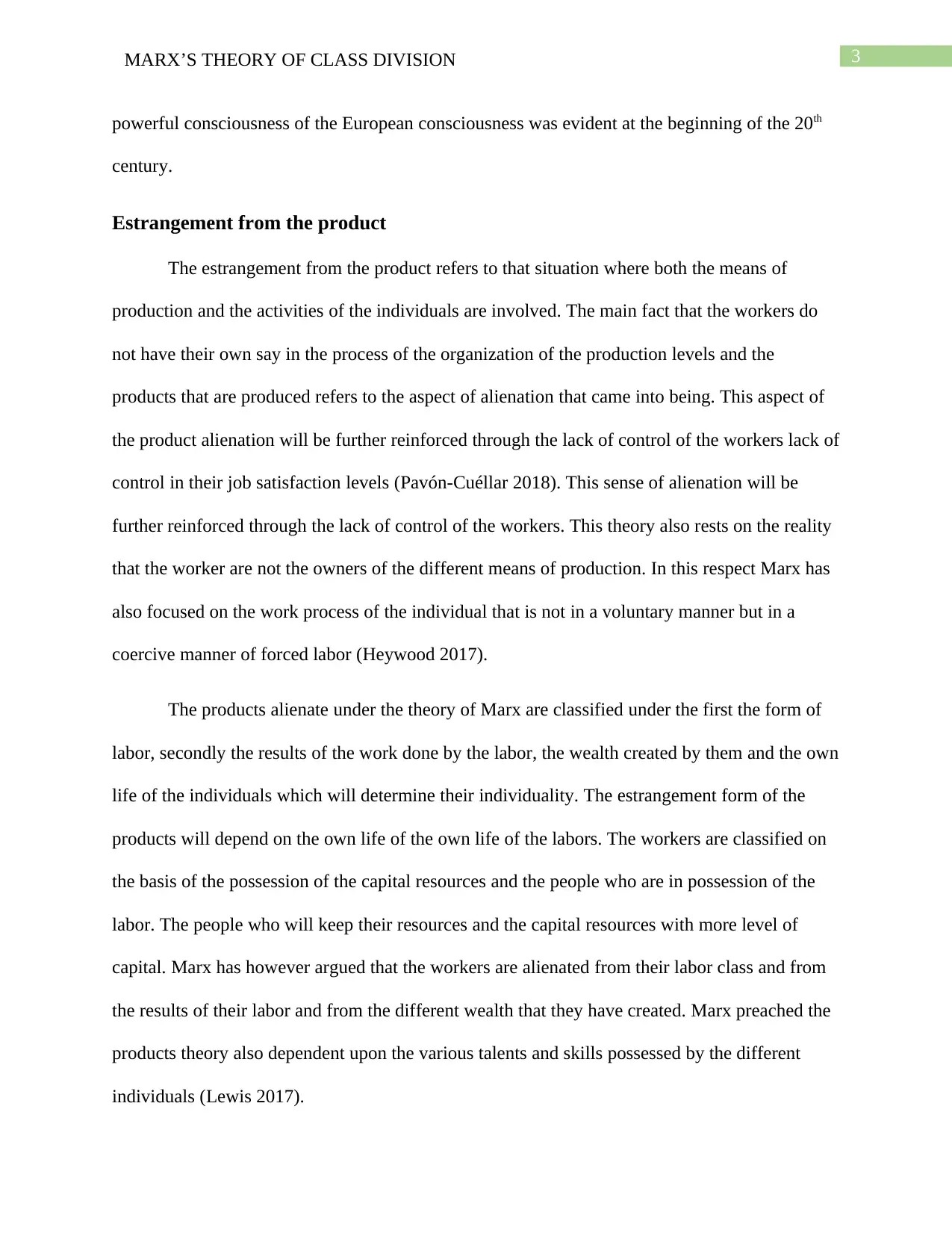
3MARX’S THEORY OF CLASS DIVISION
powerful consciousness of the European consciousness was evident at the beginning of the 20th
century.
Estrangement from the product
The estrangement from the product refers to that situation where both the means of
production and the activities of the individuals are involved. The main fact that the workers do
not have their own say in the process of the organization of the production levels and the
products that are produced refers to the aspect of alienation that came into being. This aspect of
the product alienation will be further reinforced through the lack of control of the workers lack of
control in their job satisfaction levels (Pavón-Cuéllar 2018). This sense of alienation will be
further reinforced through the lack of control of the workers. This theory also rests on the reality
that the worker are not the owners of the different means of production. In this respect Marx has
also focused on the work process of the individual that is not in a voluntary manner but in a
coercive manner of forced labor (Heywood 2017).
The products alienate under the theory of Marx are classified under the first the form of
labor, secondly the results of the work done by the labor, the wealth created by them and the own
life of the individuals which will determine their individuality. The estrangement form of the
products will depend on the own life of the own life of the labors. The workers are classified on
the basis of the possession of the capital resources and the people who are in possession of the
labor. The people who will keep their resources and the capital resources with more level of
capital. Marx has however argued that the workers are alienated from their labor class and from
the results of their labor and from the different wealth that they have created. Marx preached the
products theory also dependent upon the various talents and skills possessed by the different
individuals (Lewis 2017).
powerful consciousness of the European consciousness was evident at the beginning of the 20th
century.
Estrangement from the product
The estrangement from the product refers to that situation where both the means of
production and the activities of the individuals are involved. The main fact that the workers do
not have their own say in the process of the organization of the production levels and the
products that are produced refers to the aspect of alienation that came into being. This aspect of
the product alienation will be further reinforced through the lack of control of the workers lack of
control in their job satisfaction levels (Pavón-Cuéllar 2018). This sense of alienation will be
further reinforced through the lack of control of the workers. This theory also rests on the reality
that the worker are not the owners of the different means of production. In this respect Marx has
also focused on the work process of the individual that is not in a voluntary manner but in a
coercive manner of forced labor (Heywood 2017).
The products alienate under the theory of Marx are classified under the first the form of
labor, secondly the results of the work done by the labor, the wealth created by them and the own
life of the individuals which will determine their individuality. The estrangement form of the
products will depend on the own life of the own life of the labors. The workers are classified on
the basis of the possession of the capital resources and the people who are in possession of the
labor. The people who will keep their resources and the capital resources with more level of
capital. Marx has however argued that the workers are alienated from their labor class and from
the results of their labor and from the different wealth that they have created. Marx preached the
products theory also dependent upon the various talents and skills possessed by the different
individuals (Lewis 2017).
Paraphrase This Document
Need a fresh take? Get an instant paraphrase of this document with our AI Paraphraser
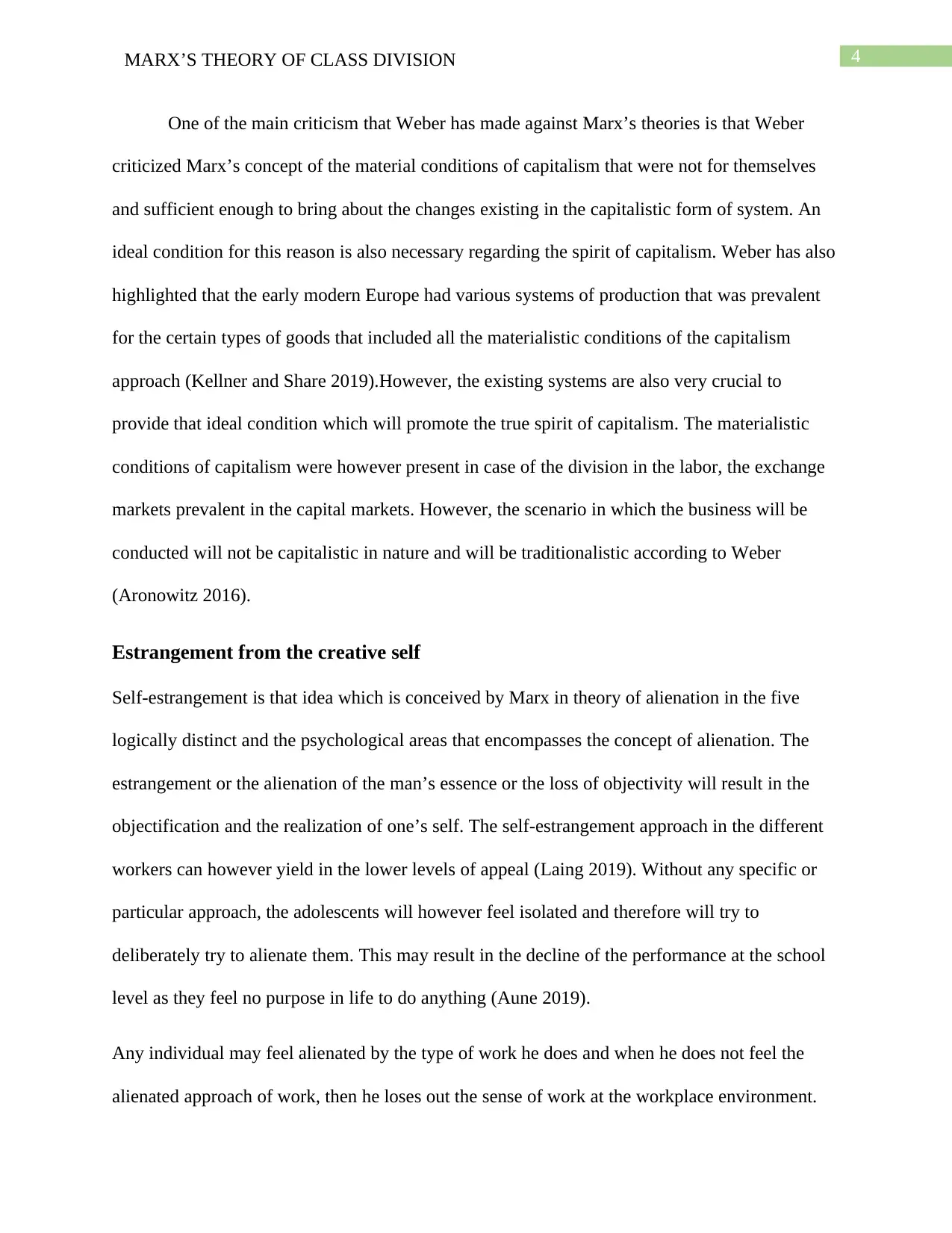
4MARX’S THEORY OF CLASS DIVISION
One of the main criticism that Weber has made against Marx’s theories is that Weber
criticized Marx’s concept of the material conditions of capitalism that were not for themselves
and sufficient enough to bring about the changes existing in the capitalistic form of system. An
ideal condition for this reason is also necessary regarding the spirit of capitalism. Weber has also
highlighted that the early modern Europe had various systems of production that was prevalent
for the certain types of goods that included all the materialistic conditions of the capitalism
approach (Kellner and Share 2019).However, the existing systems are also very crucial to
provide that ideal condition which will promote the true spirit of capitalism. The materialistic
conditions of capitalism were however present in case of the division in the labor, the exchange
markets prevalent in the capital markets. However, the scenario in which the business will be
conducted will not be capitalistic in nature and will be traditionalistic according to Weber
(Aronowitz 2016).
Estrangement from the creative self
Self-estrangement is that idea which is conceived by Marx in theory of alienation in the five
logically distinct and the psychological areas that encompasses the concept of alienation. The
estrangement or the alienation of the man’s essence or the loss of objectivity will result in the
objectification and the realization of one’s self. The self-estrangement approach in the different
workers can however yield in the lower levels of appeal (Laing 2019). Without any specific or
particular approach, the adolescents will however feel isolated and therefore will try to
deliberately try to alienate them. This may result in the decline of the performance at the school
level as they feel no purpose in life to do anything (Aune 2019).
Any individual may feel alienated by the type of work he does and when he does not feel the
alienated approach of work, then he loses out the sense of work at the workplace environment.
One of the main criticism that Weber has made against Marx’s theories is that Weber
criticized Marx’s concept of the material conditions of capitalism that were not for themselves
and sufficient enough to bring about the changes existing in the capitalistic form of system. An
ideal condition for this reason is also necessary regarding the spirit of capitalism. Weber has also
highlighted that the early modern Europe had various systems of production that was prevalent
for the certain types of goods that included all the materialistic conditions of the capitalism
approach (Kellner and Share 2019).However, the existing systems are also very crucial to
provide that ideal condition which will promote the true spirit of capitalism. The materialistic
conditions of capitalism were however present in case of the division in the labor, the exchange
markets prevalent in the capital markets. However, the scenario in which the business will be
conducted will not be capitalistic in nature and will be traditionalistic according to Weber
(Aronowitz 2016).
Estrangement from the creative self
Self-estrangement is that idea which is conceived by Marx in theory of alienation in the five
logically distinct and the psychological areas that encompasses the concept of alienation. The
estrangement or the alienation of the man’s essence or the loss of objectivity will result in the
objectification and the realization of one’s self. The self-estrangement approach in the different
workers can however yield in the lower levels of appeal (Laing 2019). Without any specific or
particular approach, the adolescents will however feel isolated and therefore will try to
deliberately try to alienate them. This may result in the decline of the performance at the school
level as they feel no purpose in life to do anything (Aune 2019).
Any individual may feel alienated by the type of work he does and when he does not feel the
alienated approach of work, then he loses out the sense of work at the workplace environment.
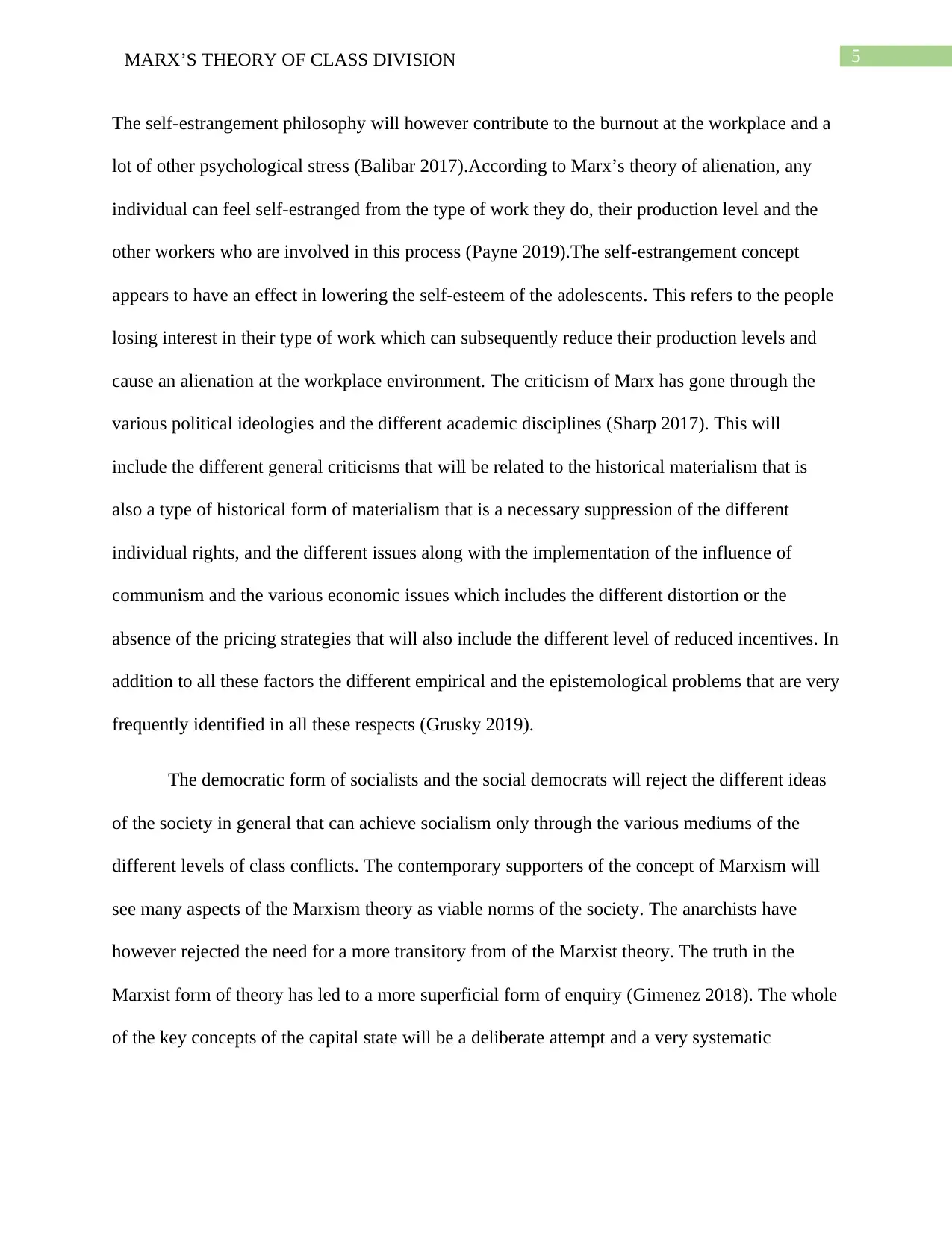
5MARX’S THEORY OF CLASS DIVISION
The self-estrangement philosophy will however contribute to the burnout at the workplace and a
lot of other psychological stress (Balibar 2017).According to Marx’s theory of alienation, any
individual can feel self-estranged from the type of work they do, their production level and the
other workers who are involved in this process (Payne 2019).The self-estrangement concept
appears to have an effect in lowering the self-esteem of the adolescents. This refers to the people
losing interest in their type of work which can subsequently reduce their production levels and
cause an alienation at the workplace environment. The criticism of Marx has gone through the
various political ideologies and the different academic disciplines (Sharp 2017). This will
include the different general criticisms that will be related to the historical materialism that is
also a type of historical form of materialism that is a necessary suppression of the different
individual rights, and the different issues along with the implementation of the influence of
communism and the various economic issues which includes the different distortion or the
absence of the pricing strategies that will also include the different level of reduced incentives. In
addition to all these factors the different empirical and the epistemological problems that are very
frequently identified in all these respects (Grusky 2019).
The democratic form of socialists and the social democrats will reject the different ideas
of the society in general that can achieve socialism only through the various mediums of the
different levels of class conflicts. The contemporary supporters of the concept of Marxism will
see many aspects of the Marxism theory as viable norms of the society. The anarchists have
however rejected the need for a more transitory from of the Marxist theory. The truth in the
Marxist form of theory has led to a more superficial form of enquiry (Gimenez 2018). The whole
of the key concepts of the capital state will be a deliberate attempt and a very systematic
The self-estrangement philosophy will however contribute to the burnout at the workplace and a
lot of other psychological stress (Balibar 2017).According to Marx’s theory of alienation, any
individual can feel self-estranged from the type of work they do, their production level and the
other workers who are involved in this process (Payne 2019).The self-estrangement concept
appears to have an effect in lowering the self-esteem of the adolescents. This refers to the people
losing interest in their type of work which can subsequently reduce their production levels and
cause an alienation at the workplace environment. The criticism of Marx has gone through the
various political ideologies and the different academic disciplines (Sharp 2017). This will
include the different general criticisms that will be related to the historical materialism that is
also a type of historical form of materialism that is a necessary suppression of the different
individual rights, and the different issues along with the implementation of the influence of
communism and the various economic issues which includes the different distortion or the
absence of the pricing strategies that will also include the different level of reduced incentives. In
addition to all these factors the different empirical and the epistemological problems that are very
frequently identified in all these respects (Grusky 2019).
The democratic form of socialists and the social democrats will reject the different ideas
of the society in general that can achieve socialism only through the various mediums of the
different levels of class conflicts. The contemporary supporters of the concept of Marxism will
see many aspects of the Marxism theory as viable norms of the society. The anarchists have
however rejected the need for a more transitory from of the Marxist theory. The truth in the
Marxist form of theory has led to a more superficial form of enquiry (Gimenez 2018). The whole
of the key concepts of the capital state will be a deliberate attempt and a very systematic
⊘ This is a preview!⊘
Do you want full access?
Subscribe today to unlock all pages.

Trusted by 1+ million students worldwide
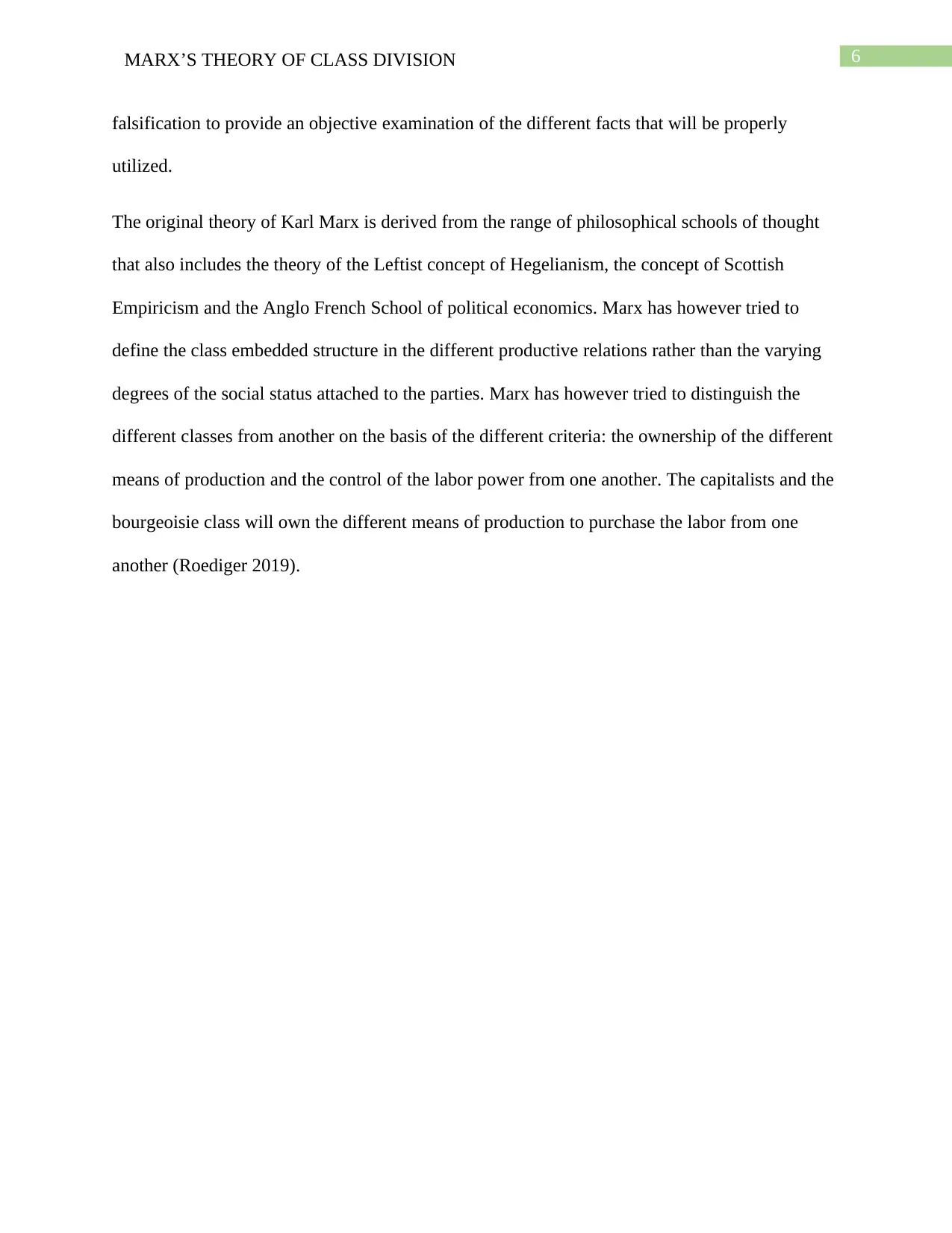
6MARX’S THEORY OF CLASS DIVISION
falsification to provide an objective examination of the different facts that will be properly
utilized.
The original theory of Karl Marx is derived from the range of philosophical schools of thought
that also includes the theory of the Leftist concept of Hegelianism, the concept of Scottish
Empiricism and the Anglo French School of political economics. Marx has however tried to
define the class embedded structure in the different productive relations rather than the varying
degrees of the social status attached to the parties. Marx has however tried to distinguish the
different classes from another on the basis of the different criteria: the ownership of the different
means of production and the control of the labor power from one another. The capitalists and the
bourgeoisie class will own the different means of production to purchase the labor from one
another (Roediger 2019).
falsification to provide an objective examination of the different facts that will be properly
utilized.
The original theory of Karl Marx is derived from the range of philosophical schools of thought
that also includes the theory of the Leftist concept of Hegelianism, the concept of Scottish
Empiricism and the Anglo French School of political economics. Marx has however tried to
define the class embedded structure in the different productive relations rather than the varying
degrees of the social status attached to the parties. Marx has however tried to distinguish the
different classes from another on the basis of the different criteria: the ownership of the different
means of production and the control of the labor power from one another. The capitalists and the
bourgeoisie class will own the different means of production to purchase the labor from one
another (Roediger 2019).
Paraphrase This Document
Need a fresh take? Get an instant paraphrase of this document with our AI Paraphraser
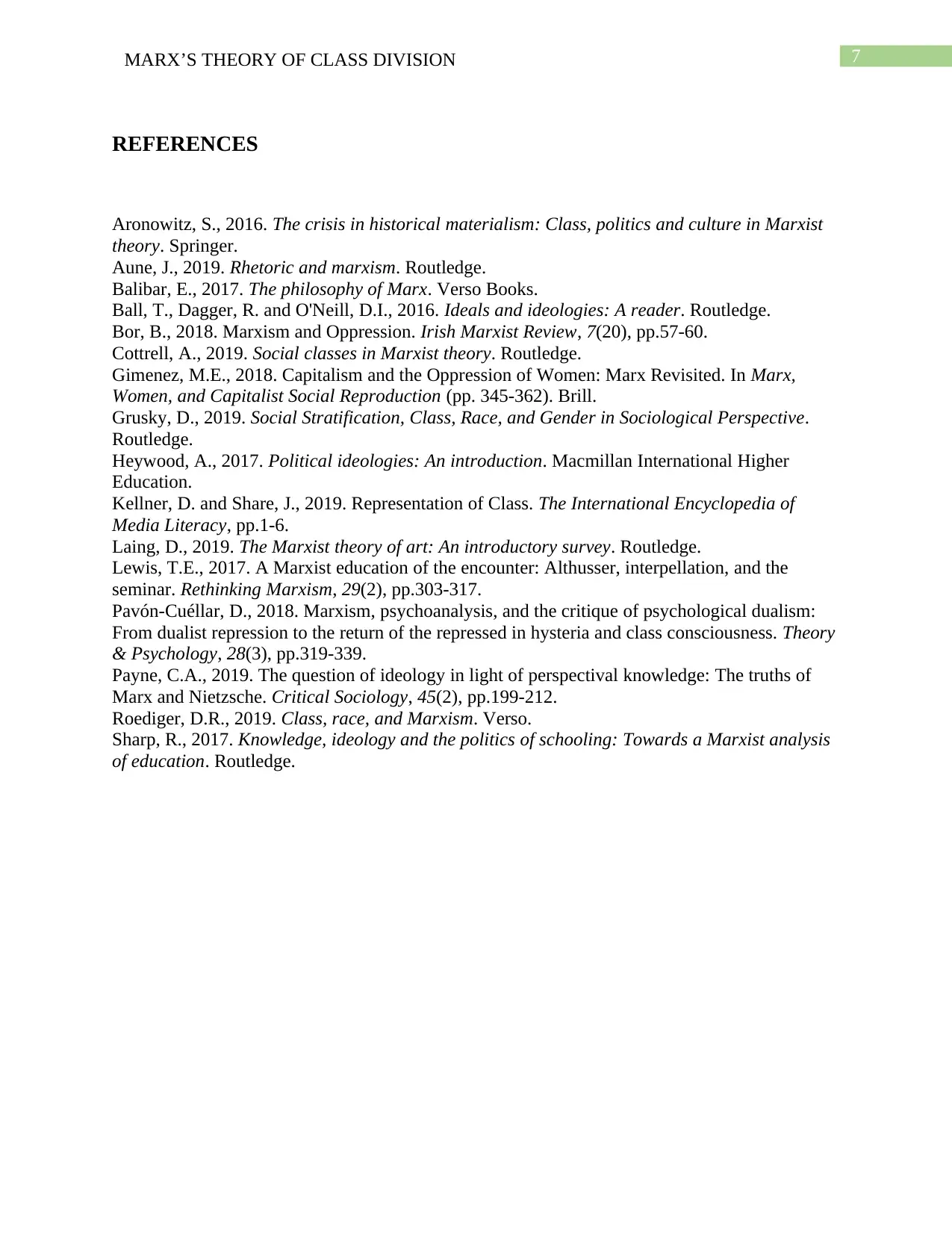
7MARX’S THEORY OF CLASS DIVISION
REFERENCES
Aronowitz, S., 2016. The crisis in historical materialism: Class, politics and culture in Marxist
theory. Springer.
Aune, J., 2019. Rhetoric and marxism. Routledge.
Balibar, E., 2017. The philosophy of Marx. Verso Books.
Ball, T., Dagger, R. and O'Neill, D.I., 2016. Ideals and ideologies: A reader. Routledge.
Bor, B., 2018. Marxism and Oppression. Irish Marxist Review, 7(20), pp.57-60.
Cottrell, A., 2019. Social classes in Marxist theory. Routledge.
Gimenez, M.E., 2018. Capitalism and the Oppression of Women: Marx Revisited. In Marx,
Women, and Capitalist Social Reproduction (pp. 345-362). Brill.
Grusky, D., 2019. Social Stratification, Class, Race, and Gender in Sociological Perspective.
Routledge.
Heywood, A., 2017. Political ideologies: An introduction. Macmillan International Higher
Education.
Kellner, D. and Share, J., 2019. Representation of Class. The International Encyclopedia of
Media Literacy, pp.1-6.
Laing, D., 2019. The Marxist theory of art: An introductory survey. Routledge.
Lewis, T.E., 2017. A Marxist education of the encounter: Althusser, interpellation, and the
seminar. Rethinking Marxism, 29(2), pp.303-317.
Pavón-Cuéllar, D., 2018. Marxism, psychoanalysis, and the critique of psychological dualism:
From dualist repression to the return of the repressed in hysteria and class consciousness. Theory
& Psychology, 28(3), pp.319-339.
Payne, C.A., 2019. The question of ideology in light of perspectival knowledge: The truths of
Marx and Nietzsche. Critical Sociology, 45(2), pp.199-212.
Roediger, D.R., 2019. Class, race, and Marxism. Verso.
Sharp, R., 2017. Knowledge, ideology and the politics of schooling: Towards a Marxist analysis
of education. Routledge.
REFERENCES
Aronowitz, S., 2016. The crisis in historical materialism: Class, politics and culture in Marxist
theory. Springer.
Aune, J., 2019. Rhetoric and marxism. Routledge.
Balibar, E., 2017. The philosophy of Marx. Verso Books.
Ball, T., Dagger, R. and O'Neill, D.I., 2016. Ideals and ideologies: A reader. Routledge.
Bor, B., 2018. Marxism and Oppression. Irish Marxist Review, 7(20), pp.57-60.
Cottrell, A., 2019. Social classes in Marxist theory. Routledge.
Gimenez, M.E., 2018. Capitalism and the Oppression of Women: Marx Revisited. In Marx,
Women, and Capitalist Social Reproduction (pp. 345-362). Brill.
Grusky, D., 2019. Social Stratification, Class, Race, and Gender in Sociological Perspective.
Routledge.
Heywood, A., 2017. Political ideologies: An introduction. Macmillan International Higher
Education.
Kellner, D. and Share, J., 2019. Representation of Class. The International Encyclopedia of
Media Literacy, pp.1-6.
Laing, D., 2019. The Marxist theory of art: An introductory survey. Routledge.
Lewis, T.E., 2017. A Marxist education of the encounter: Althusser, interpellation, and the
seminar. Rethinking Marxism, 29(2), pp.303-317.
Pavón-Cuéllar, D., 2018. Marxism, psychoanalysis, and the critique of psychological dualism:
From dualist repression to the return of the repressed in hysteria and class consciousness. Theory
& Psychology, 28(3), pp.319-339.
Payne, C.A., 2019. The question of ideology in light of perspectival knowledge: The truths of
Marx and Nietzsche. Critical Sociology, 45(2), pp.199-212.
Roediger, D.R., 2019. Class, race, and Marxism. Verso.
Sharp, R., 2017. Knowledge, ideology and the politics of schooling: Towards a Marxist analysis
of education. Routledge.
1 out of 8
Related Documents
Your All-in-One AI-Powered Toolkit for Academic Success.
+13062052269
info@desklib.com
Available 24*7 on WhatsApp / Email
![[object Object]](/_next/static/media/star-bottom.7253800d.svg)
Unlock your academic potential
Copyright © 2020–2026 A2Z Services. All Rights Reserved. Developed and managed by ZUCOL.





